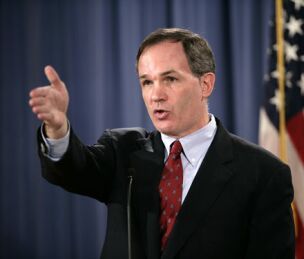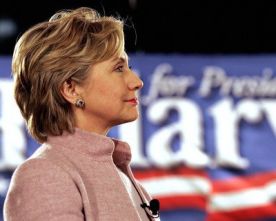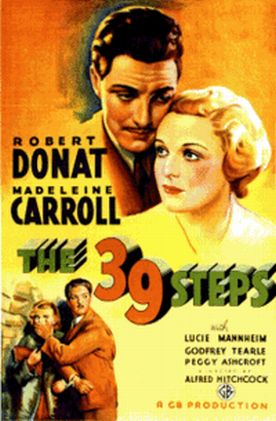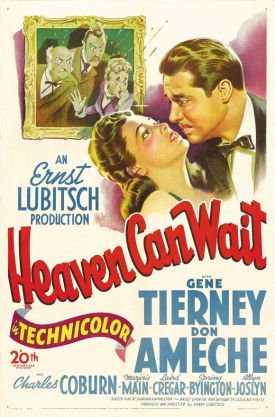In Defense of Cover-Ups
From The New Criterion“It’s not the crime, it’s the cover-up.” That may turn out to be the most over-used media cliché of the year. Like so many other morsels of media wit and wisdom it is clever, memorable, worldly-wise and wrong — at best a half-truth. Of course you can make a case that the cover-up is always worse than the crime in the media’s eyes, since by definition a cover-up means keeping information out of the hands of (at a minimum) the media. Understandably, they themselves regard nothing as being worse than that. But to anyone with a smidgen of moral discrimination no such blanket statement could ever be made. Indeed, a moment’s thought will persuade us that any cover-up which was actually worse than the crime could well be said to be justified, since if the crime was so trivial as to be less bad than withholding information about it, then withholding information about it couldn’t be very bad either. Nearly always it is the crime and the cover-up, and in the rare cases when, as in the indictment of I. Lewis Libby, Vice-President Cheney’s chief of staff, the crime is the cover-up, it ought to tell you that something is dreadfully wrong with the prosecution.
Doubtless poor Mr Libby would have done well to remember how easy it is for a zealous prosecutor like Patrick Fitzgerald to turn any misstatement of fact into an indictable offense, but it’s far from certain that he would have escaped indictment even if he had. By treating Mr Libby as if he were guilty of something when he was, on Mr Fitzgerald’s own showing, guilty of nothing, the prosecutor had induced him to lie — whereupon he was guilty of something. This dubious proceeding together with the insubstantiality of the charge must inevitably have suggested to Bush partisans that it had been Mr Fitzgerald’s aim to bag one or more high administration officials, and that if one crime wouldn’t do for the purpose, another would be found. And even if it were not, no one in the media was suggesting that there would have been anything wrong about even the reality, let alone the appearance of such partisanship. It seems to me, anyway, that a wise judge would take account of the fact that, if the course of justice, in the form of an indictment for something other than perjury, was not there to be obstructed, then there could hardly be a conviction for obstructing it. In other words, no crime, no cover up.
But the media have been as always too fond of their own wisdom, as well as their love of scandal, to consider any such humane argument. “For years in Washington, they’ve all ended the same way — perjury and obstruction of justice” — so Scott Shane of The New York Times quoted Chuck Colson, who was himself convicted of obstruction of justice in the Watergate affair, as saying. “I don’t know why people don’t learn this lesson.” Tsk tsk, as the comic book characters of my youth used to say. There’s nothing like a felony conviction to make a man a useful quote-giver when the media are in the midst of one of their frequent binges on wisdom-after-the-fact. And, having drunk the crime-cover-up disjunction to the lees, they naturally reached for another bottle in the form of their equally specious wisdom about the War in Iraq. Not only did Mr Fitzgerald find nothing criminal in the mention by administration officials to reporters of the place of employment of Mrs Valerie Wilson, he went out of his way specifically to dissociate his investigation from any of the seemingly endless second-guessing by media and other anti-Bush forces about the ever-loving but triumphantly non-existent Weapons of Mass Destruction in Iraq.
Not that that made any difference either to the media or to the Democrats, who could hardly allow themselves to be deprived of so irresistible a pleasure as belaboring the administration with those insubstantial weapons one more time. For more than two years now, they have been thinking that there must be some way to turn them from a mistake into a scandal, and so enthusiastically did the media’s usual suspects plunge into the effort that Harry Reid, the leader of the Democrats in the Senate, was inspired to call the Senate into closed session as a way, paradoxically, of protesting against the administration’s lack of “openness” about the matter. Jim Hoagland of the Washington Post even had the novel idea of blaming President Bush for not being involved in the leak of Mrs Wilson’s name. “That,” he said, addressing the President directly, “is part of the problem.”
Your self-advertised disdain for the media and for the confusing, often contradictory flood of information that washes over a distracted public helped create a White House in which stealth tactics ran rampant and open debate was suppressed. . . You feared openness. You feared laying out your fallibilities along with your strengths for others to judge. You feared laying out facts — good, bad and indifferent — for others to judge. You were unable even to acknowledge that the fiefdoms within your administration were at war. So all attacks had to be subterranean.
Feared openness, eh? Well, did you ever! Yet the media’s frequent calls for openness on the part of the administration were not always supported by openness in their own dealings with the public. In particular, the New York Times chose to dissociate itself from its reporter, Judith Miller, whom only days before it had been hailing for her heroism in going to jail rather than reveal the name of a source — who turned out to be Mr Libby — with a dark and unsupported insinuation in a memo from the managing editor, Bill Keller, that she had had an inappropriate “entanglement” with Mr Libby. The supposed “smear” against Mrs Wilson, that she worked for the CIA, looks like a big wet kiss by comparison. A typically vicious character assassination by Maureen Dowd on the paper’s own op-ed page bespoke further resentments and hostilities directed at its one-time star reporter which lurked beneath the surface and which readers could only guess at.
For, like other inscrutable and power-hungry organizations it could name, the Times left us to read between the lines as to what was really the cause of Ms Miller’s astonishing fall from grace. Perhaps it came when her fellow reporters realized that the time she had spent in jail had been for nothing. She ended up testifying under the same conditions that Matt Cooper of Time had agreed to without going to jail, and that she could herself have testified under 85 days earlier. This made her original choice not to talk look less like heroism, more like grand-standing. More serious, some conjectured, was the resentment against her felt by other Timesmen for her earlier reporting on the WMDs in Iraq which, in the days before their non-existence became a media shibboleth, had supported the administration’s line. To the extent that this resentment was real, it was felt in the context of a gathering movement at the Times and other news outlets towards another bout of the media’s favorite pastime of ostentatious but feckless self-flagellation. “Yes,” wrote the editorial page editor of The Milwaukee Journal-Sentinel, “regrettably on the matter of WMD, count us as among the many who were duped.”
The word “duped” of course begs the question. It assumes that the administration had known all along that there were no WMDs and had deliberately deceived the media into believing that there were in order to justify a war undertaken for other reasons. Thus did those who took this line cultivate in themselves the penitent’s delicious sense of self-righteousness while at the same time validating the assumptions of the “Bush lied” anti-war left without having to produce so much as a shred of evidence for such a vile charge. Yet it is hard to be too censorious towards the media or even the anti-warriors for making it when the President himself has never thought it worth his while to defend himself against it. [N.B. This was written in early November, before the Veterans’ Day speech in which he did defend himself. See “The Field of Honor” in The New Criterion of January, 2006] As in his debates with Senator Kerry last year when he simply ignored the Senator’s most outrageous and easily-answered charges, he was obviously implementing a deliberate policy of non-reply to criticism, and especially this kind of personal criticism. If I had to guess at the policy’s origin in the mind of Karl Rove, I would say he must have reasoned that in this media culture, the more scurrilous the charges, the more likely any reply to them is to be taken as a confirmation of them — or at best to be disregarded. People have grown used to the assumption that personal calumny is all just part of the way politicians speak about each other when mining for votes. And the more used to it people are, the more politicians do in fact speak that way. Therefore, if charges of bad faith are discounted at source, it does those who are victims of them no good to deny them, and may even lend such charges a greater credence.
The media, of course, encourage this aspect of the contemporary political dialogue not only because vicious slanders make better copy than reasoned policy statements but also because their own role in that dialogue is validated by every suggestion that politicians don’t mean what they say but something subtextual which it is the media’s job to explain. Press and politicians together, therefore, conspire to purge actual political discourse, the language of the politicians themselves, of all meaning. Hypocritical calls by the media for “openness” mask their own determination to ensure that they do not lose their monopoly on uncovering what has been covered up in the first place for their benefit. Meanwhile, the political opposition is more than happy to join with the media’s calls for openness because the insinuation that those in power have something discreditable to hide is almost as advantageous to it as openness itself would be. Mr Hoagland doesn’t mention the significance of the fact that it is the Democrats who are the party of openness: open jubilation at the indictment of Mr Libby, for example, and open disappointment that Mr Fitzgerald’s net failed to haul in the much bigger fish — indeed, what was beginning to look like the Democrats’ Great White Whale — of Mr Rove. They even had a name, “Fitzmas,” for the day of celebration and rejoicing that they expected to follow the expected indictments. There’s openness for you!
So far has the level of civility in our public life sunk that there was not even the most hypocritical show of regret by his political enemies that a loyal servant of the Bush administration should have found himself in legal trouble. Perhaps they thought it would have been as wicked of them to have covered up their feelings of hatred and resentment towards Bush and all his works as it was for Mr Libby to cover up his role in the non-criminal “outing” of Mrs Wilson. In such a political climate it would have taken a political death-wish for anyone in the administration to air its doubts and “fallibilities” in public, and an invitation to such an unforgiving enemy to exploit any such vulnerabilities. Once again, it is the media which conspire to reduce our political life to its most emotional level as a mass of incandescent hatreds. Here, for instance, is how the Washington Post’s “Reliable Source” column gleefully reported the reaction of his senior thesis adviser at Princeton to the nomination of Judge Samuel Alito to the Supreme Court. “I confess surprise,” said Professor Emeritus Walter Murphy, “that a man so dreadfully intellectually and morally challenged as George W. Bush would want a person as intellectually gifted, independent and morally principled as Sam Alito on the bench.”
Of course, as he was only feigning surprise he might just as easily have feigned a more gracious congratulation of his former student. Alito had been on everyone’s short-list of likely appointees, as the professor emeritus must have known. He just saw an opportunity, like that of an actor or a musician at an awards ceremony, to certify his membership in the club of right thinkers by seizing the occasion to announce his hatred of George Bush to the world. Does he suppose that the world wants or needs to know about this hatred, or that it is so short of Bush-haters that they must make their presence known on every conceivable occasion? Is there any real danger that some latter-day McCarthy of the left will turn up his past connection with a Bush appointee and brand him as a Republican himself? What is the gain to anyone or anything of such a comment apart from Professor Murphy’s vanity at being able to make a celebrity’s irrelevant statement of opinion. Being famous, even if it is for less than fifteen minutes, means that you have a right to make your feelings known — that’s the iron law of the celebrity culture.
Those of us who don’t have celebrity-licenses, and who therefore have to rely on intelligence, wit or special information to make our opinions heard, may reflect that the frequent airing of such hatreds results in a regrettable lack of grace in our public life, as all these microscopic celebrities with their even more microscopic claims upon the public’s attention vie with each other to change the subject of every conversation to themselves. It’s a small thing to notice or care about, I know, but of many such small things are made the very big thing of a degraded public culture and the political paralysis that comes with constant toxic incivility. Of course it’s no news that the commodity price of reticence and grace in the political markets has been in the tank for years. Like Claudius responding to Laertes’s promise to cut Hamlet’s throat in the church, our political leaders think that no place indeed should political error sanctuarize. Partisanship should have no bounds.”
But such bloodthirstiness is not all their own idea. They have been taught it by the media’s hypocritical attachment to “The Truth.” Like any cocktail party bore who cites Truth as his title to be offensive or insulting, the media never doubt for a moment their own right to know and publish everything, and to demonize those who would abridge that right in the smallest degree. That’s why I think it’s time for someone to step forward with a defense of the good old-fashioned political cover-up. I take my model from the Mort d’Arthur of Sir Thomas Malory, whose vision of the good society of King Arthur’s Camelot is founded on a cover-up. The king’s best knight, Sir Launcelot, is having an affair of the heart with the Queen. Everyone knows it, probably even the King (he “had a demyng of hit,” says Malory). But no one says anything about it for the very good reason that everyone knows what would be the fate of him who publicizes the fact. Launcelot would call him a liar and offer to “preve it upon his body” that he lies; he would then be obliged to challenge Launcelot to single combat, and Launcelot would defeat and probably kill him as he defeated or killed every opponent he ever faced, apart from his own appetites. Then the news would cease to be news anymore. Eventually, however, the Aggravayne and Mordred Daily Herald, proclaiming the people’s right to know, conspire to expose the couple in flagrante. Aggravayne and a dozen other knights pay with their lives (“for there was none of the twelve knyghtes myght stonde sir Launcelot one buffet”), but Mordred is only wounded and achieves his aim of destroying the fellowship of the Round Table.
Never for a moment does any reader of Malory suppose that Mordred’s purposes are disinterested. He has no time for the canting hypocrisy of those who seek their own ends by an appeal to Truth. Though he is fully aware of the hopelessness of Launcelot’s attempts to keep his private life out of the headlines, he has the good sense to recognize that what keeps successful societies functioning is always a measure of forbearance towards and a willingness to be quiet about the foibles and mistakes and errors of one side by the other. There are many things that people have the “right to know,” but there are many others which they have the right not to know, as the knowledge could only produce destruction and demoralization. Those whose business is publishing that which people did not know before are of course reluctant to admit that there should be any limits at all to the desirability of such knowledge, but the rest of us, if we were allowed to choose, would probably choose to remain ignorant of that which could only produce strife and dissension and hatred.
Of course, anyone attempting to defend the cover-up nowadays runs into the problem of the law which, egged on by the media, also supposes itself to have the right to know everything. From the media’s point of view this makes perfect sense. Knowledge is always that much more piquant and therefore marketable when it involves allegations of criminal behavior. It’s harder to see what is in the pursuit of socially and politically damaging information for the law itself. True, investigating things that are not in need of investigation, or that are emphatically in need of non-investigation, makes more work for lawyers, but there’s not much money in it. Wouldn’t they do better to go back to suing tortfeasors so that they can buy themselves bigger boats and vacation “homes” rather than wrecking the civility of public life just for the hell of it, out of the purity of their desire for Truth and Justice? I can make this argument in good conscience about Mr Fitzgerald’s investigation of the Bush administration because I also made it about Mr Starr’s investigation of the Clinton administration. So let’s hear it for more and better cover-ups. “Openness” is a good thing only up to a limit that ought to be defined by decency and concern for public civility and trust in government. That it is in the media’s own interest not to recognize any such limit is the one thing they can never be open about.
Discover more from James Bowman
Subscribe to get the latest posts to your email.







